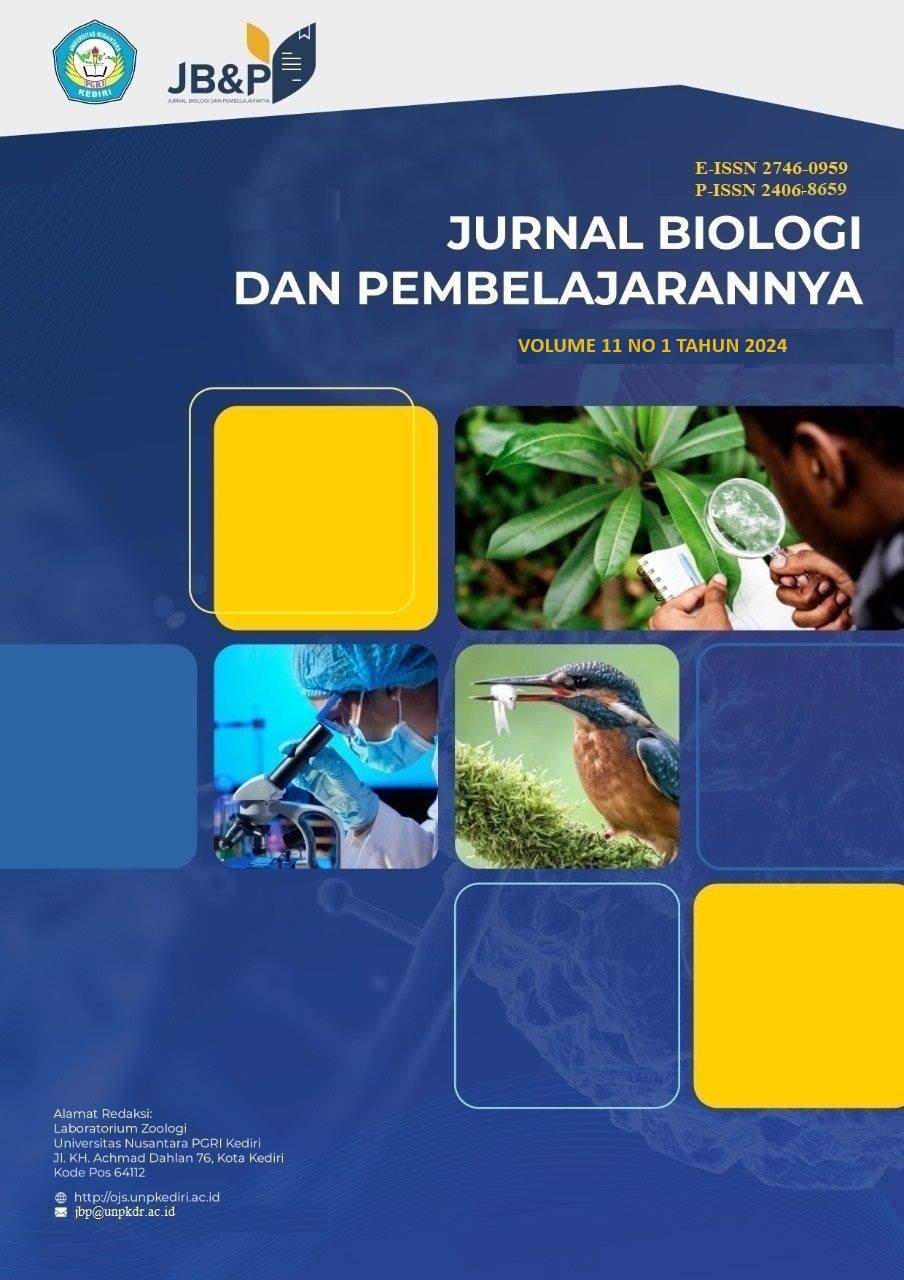Aktivitas Antibakteri Daun Mangga (Mangifera Indica L) Terhadap Bakteri Pada Sputum
DOI:
https://doi.org/10.29407/jbp.v11i1.21571Keywords:
Mango leaves, resistance, antibiotics, antibacterial, sputumAbstract
Mango (Mangifera indica L.) is a native plant from Southeast Asia, and has been widely distributed in tropical and subtropical regions of the world. Mango leaf extract is reported to contain alkaloids, phenols, saponins, coumarins, tannins, flavonoids, triterponoids, steroids and glycosides which function as antimicrobial compounds that can inhibit bacterial growth. It is hoped that this content can be a solution as an antibacterial to replace antibiotics, because inappropriate use of antibiotics can cause bacteria to become resistant. The aim of this study was to test the antibacterial activity of mango leaves against bacteria from sputum samples. The extraction method used was infusion with paper discs on Mueller Hinton Agar (MHA) medium which was incubated at 37°C for 24 hours. The positive control used was the antibiotic Amoxicillin
References
Anggraeni, V.J., Yulianti, S. & Panjaitan, R.S. (2020). Artikel Review : Fitokimia dan Aktivitas Antibakteri dari Tanaman Mangga (Mangifera indica L.). Indonesia Natural Research Pharmaceutical Journal, 5(2), 102-113.
Basyar, F.K., Carolia, N., Oktafany. & Oktarlina, R.Z. (2022). Aktivitas Antibakteri Dari Tanaman Mangga (Mangifera indica L.): Tinjauan Pustaka. Agromedicine, 9(1), 31-36.
Budiharjo, T. & Purjanto, K.A. (2016). Pengaruh Penanganan Sputum Terhadap Kualitas Sputum Penderita TBC Secara Mikroskopis Bakteri Tahan Asam. Jurnal Riset Kesehatan, 5(1), 40-44.
Djarot, P., Diana, I., Indriati, D. (2020). Formulasi Dan Uji Anti Bakteri Sediaan Gel Ekstrak Daun Mangga Arumanis (Mangifera indica L.) Sebagai Anti Bakteri Staplylococcus aureus Dan Propionibacterium acnes. Fitofarmaka Jurnal Ilmiah Farmasi. 10(1). 84-96.
Moja, F. K. (2015). Uji Aktivitas Antibakteri Ekstrak Metanol Daun Mangga Bacang (Mangifera Foetida L.) Terhadap Salmonella typhi Secara In Vitro. Jurnal Mahasiswa PSPD FK Universitas Tanjungpura, 3(1).
Novitasari, I. W. (2015). Uji aktivitas antibakteri infusa daun mangga bacang (Mangifera foetida L.) terhadap pertumbuhan Salmonella typhi. Jurnal Mahasiswa PSPD FK Universitas Tanjungpura, 3.(1).
Nugraha, A.C., Prasetya, A. T., Mursiti, S. (2017). Isolasi, Indentifikasi, Uji Aktivitas Senyawa Flavonoid sebagai Antibakteri dari Daun Mangga. Indonesian Jurnal of Chemical Science, 6(2). 92-96.
Pelealu, E., Wewengkang, D. & Sumantri, S. (2021). Uji Aktivitas Antibakteri Ekstrak dan Fraksi Spons Leucetta chagosensis dari Perairan Pulau Mantehage Sulawesi Utara Terhadap Pertumbuhan Bakteri Staphylococcus aeurus dan Escherichia coli. Pharmacon, 10(2), 834-840.
Ristanti, R., Khotimah, S., Rahmayanti, S. (2017). Aktivitas Antibakteri Ekstrak Etil Asetat Daun Mangga Bacang ( Mangifera foetida L. ) Terhadap Streptococcus pneumoniae Secara In Vitro. Jurnal Cerebellum. 3(2). 798-807.
Roza, R.M., Fitmawati., Kapli, H. & Suzanti, F. (2023). Antibacterial Activity of Extracts of Wild Mango (Mangifera spp.), Ruellia tuberosa L and Leucobryum sp. Causes of Gangrene in Patients with Diabetes Mellitus. Jurnal Biologi Tropis, 155-163.
Saifudin, A. (2014). Senyawa Alam Metabolit Sekunder Teori, Konsep, Dan Teknik Pemurnian. Yogyakarta: Deepublish (Grup Penerbitan CV Budi Utama).
Sukertiasih, N.K., Megawati, F., Meriyani, H. & Sanjaya, D.A. (2021). Studi Retrospektif Gambaran Resistensi Bakteri Terhadap Antibiotik. Jurnal Ilmiah Medicamento, 7(2), 108-111.
Viando, E. J., Sugiaman, V. K., Pranata, N. (2023). Aktivitas Antibakteri Ekstrak Daun Mangga Gedong Terhadap Streptococcus mutans: Studi Eksperimental. Jurnal Kedokteran Gigi Universitas Padjadjaran. 35(2). 134-140.
Wardani, A.K., Kusumawati, D., Suproborini, A. (2023). Kandungan metabolit sekunder ekstrak etanol daun mangga (Mangifera indica L.). Seminar Nasional Prodi Farmasi UNIPMA (SNAPFARMA). 1.(1).
Yulia, Y., & Riza, R. (2023). Uji Aktivitas Anti Bakteri dari Ekstrak Etanol Daun Mangga (Mangifera indica L.) Terhadap Bakteri (Eschericia coli). JURNAL FARMASI ABDURAHMAN, 1(1), 11-15
Downloads
Published
Issue
Section
License
Authors who publish with this journal agree to the following terms:
- Copyright on any article is retained by the author(s).
- The author grants the journal, right of first publication with the work simultaneously licensed under a Creative Commons Attribution License that allows others to share the work with an acknowledgment of the work’s authorship and initial publication in this journal.
- Authors are able to enter into separate, additional contractual arrangements for the non-exclusive distribution of the journal’s published version of the work (e.g., post it to an institutional repository or publish it in a book), with an acknowledgment of its initial publication in this journal.
- Authors are permitted and encouraged to post their work online (e.g., in institutional repositories or on their website) prior to and during the submission process, as it can lead to productive exchanges, as well as earlier and greater citation of published work.
- The article and any associated published material is distributed under the Creative Commons Attribution-ShareAlike 4.0 International License













